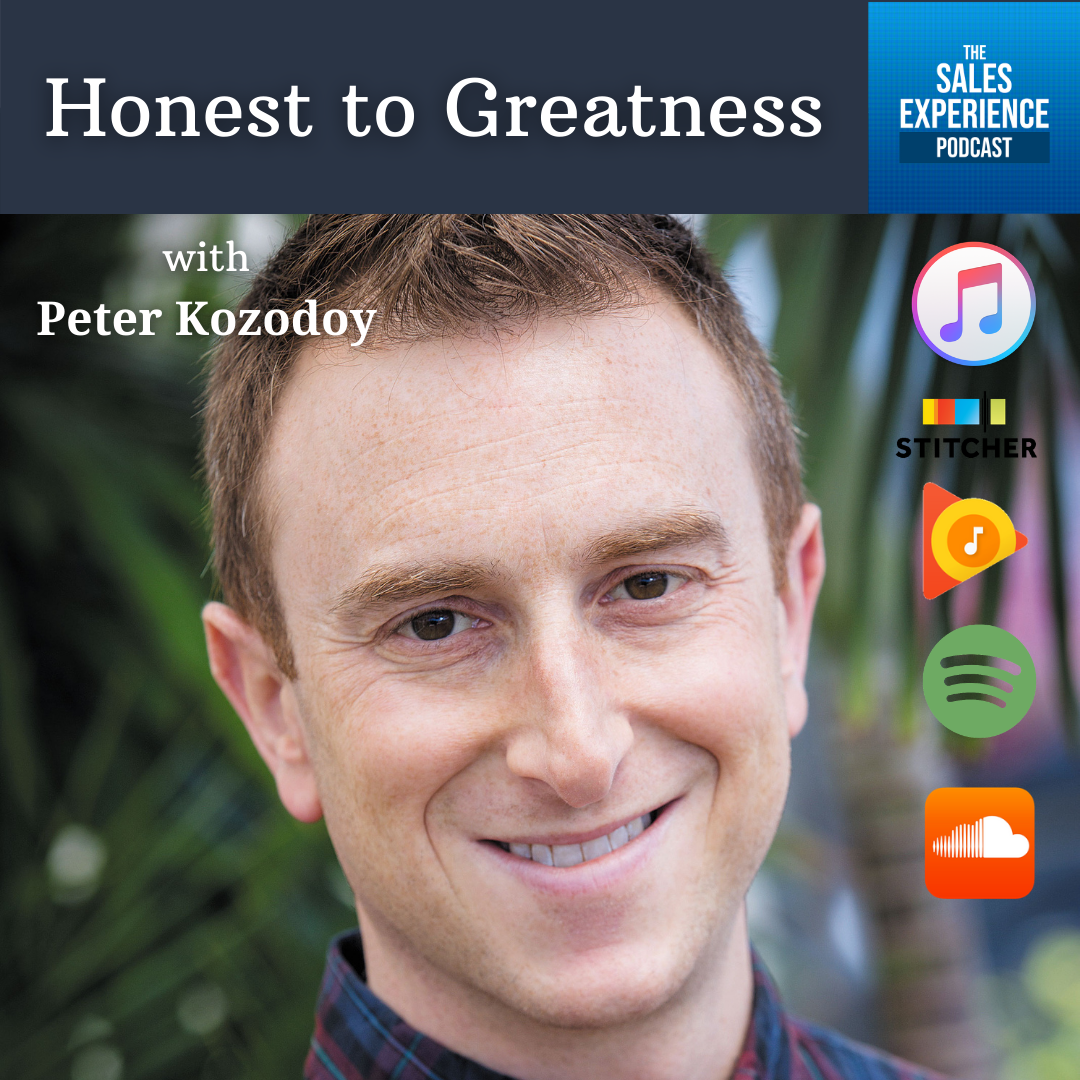Why do you believe honesty might have taken a backseat in the past, and what factors are now prompting a shift towards greater transparency?
[E296] Honest to Greatness, with Peter Kozodoy (Part 1)
In the hustle and bustle of the business scenario today, speed is essential to making decisions and it has become so easy to forget the most important trait, being honest. When you think about traditional marketing practices, honestly probably isn’t the first thing to mind.
As it has been apparent that most businesses only focus on persuasion more than the absolute truth, we are now beginning to see a shift towards honesty in businesses, specifically in relation to Sales & Marketing. Top performing salespeople know that there is nothing more powerful than being honest, strategically. Any product is naturally imperfect like anything else. It has its own strengths and weaknesses. Rather than mystify the flaws of your products or services, you should embrace them and speak about them openly, honestly, and most importantly work to make them better.
In this episode, Peter Kozodoy, author of the book Honest to Greatness, talks about how strategic honesty can be leveraged to achieve great success. He talks about acknowledging weakness while maintaining a positive positioning is very endearing to customers. Instead of turning customers away, this honest communication inculcates a sense of confidence to the viewers and customers that a business understands their shortcomings and will change accordingly.
In the world of sales, true honesty is rare. But acknowledging your shortcomings will only make customers trust the legitimacy of your strengths and that’s why you can use it to your advantage. It will surely open doors to more prospects wanting to do business with you.
Book your free Sales Power Call with Jason
Enroll in the Persuading Like A Professional Online Mini-Course
Download The Power of Authentic Persuasion ebook
Connect with Jason on LinkedIn
Connect with Peter on LinkedIn
Peter’s Bio
Peter Kozodoy is the award-winning author of Honest to Greatness, an Inc. 5000 serial entrepreneur, TEDx speaker, and business coach who works with organizations and their leaders to help them overcome self-limiting bullsh*t and use honesty to achieve greatness.
His articles on leadership and entrepreneurship have appeared in Forbes, Inc., HuffPost, PR Daily, and more. He holds a BA in economics from Brandeis University and an MBA from Columbia Business School and lives outside New York City with his wife and their spoiled dog. To strike up an honest conversation, visit PeterKozodoy.com.
Links
Website: https://peterkozodoy.com/go
-
Show Transcript
Jason: Peter Kozodoy is my guest on the sales experience this week. I am super excited to chat with him for many reasons, one of which he is the award winning author of Honest to Greatness, an Inc. 5000 serial entrepreneur, TEDx speaker, business coach. who works with organizations. He has written articles on leadership and entrepreneurship for places like Forbes, Huffington Post, PR Daily and more.
He's got a bachelor's in economics. He's got an MBA. We talk a lot about his book and the framework of that and how. that is right. So the book again is honest to greatness. Make sure you check that out. He's going to talk about it a lot, but it's such a valuable tool. And we start off the conversation talking about strategic honesty and then his point of view with mine about authentic persuasion, and just talk about the value of that in community, in conversations, relationships, and then mostly in sales.
So here we go. Enjoy this series, this conversation with Peter, welcome to the sales experience podcast.
Peter: Awesome to be here, Jason.
Jason: I'm just looking forward to this. The moment we started talking and preparing for this and planning this, the book that you have, Honest to Greatness, I think is like the perfect.
Kind of title. There it is for anyone watching the video. I love that you do that. Even when I was on your show, you're like, Hey, here's my book. I have it. There's mine right there, which I love. I think it's great. And where I wanted to start this conversation is a little bit of the background,
which we'll talk in with some other questions that I have.
But one of the things that stood out the most to me was the strategic honesty piece. And so explain that a bit.
Peter: When I first got writing and people are figuring out like, I did a Ted talk about honesty and people are so excited and they're like, Oh my gosh, that's great. I'm so honest, right?
I just wear my heart on my sleeve and I tell people exactly like it is. And I'm like you're probably just a jerk then. That's not what I'm talking about. In fact, in many ways, it's the opposite of what I'm talking about. One of the CEOs in my book makes a great point. He says, if you're flying in an airplane and the pilots come over the intercom and they say folks, and we've never seen storm clouds like that before.
So may not make it through this one. Please fasten your belts. We're going to give it a try. Is that honest? Yes. But is it helpful? Not really. Honesty is only as good as the trust it creates. And I want to be clear when we're talking about honesty. Jason, I was very fortunate and touched that the book premiered as the number one new release on Amazon for business ethics and for a couple other categories.
Listen, that's all well and good, but this is not an ethics book, right? I think people should be ethical and moral and all that happy horse crap, but this is about how to achieve outcomes, like how to make profits, how to get stuff done. In your life and business in the completely transparent 21st century society that we live in.
Which is why it's not just honesty, right? It's not just blurring out whatever you feel in that moment. It's exactly the opposite in many cases. Being strategically honest and deploying honesty. Weaponizing it in order to achieve outcomes. And I'm sure over the course of our time today, we'll cover so many stories and case studies and tactics that I cover in the book that will actually help you use it.
Wield it.
Jason: I love the fact that you said this is not an ethics book, but it's important to be ethical with it because you're using words like weaponizing and tactics with honesty. And I know enough from being on the sales leadership side and working with sales teams and seeing we'll just say bad salespeople with bad intentions who are on the manipulation side where they're pretending to care on a phone call with somebody and they hang up.
And they literally just start saying terrible stuff about that person or how much they're going to make off of them and how much they don't care. How do you address that? How do you set that up? So people hear words again, like weaponize and tactics with the right intention.
Peter: You're right. It is about the intentions, by the way, the intentions come out sooner or later.
And that's the whole point of the book. It's like, when you look at all the scandals that have come up over the past, even, going back to 2008, starting in the financial crisis, right? Then we have the Wells Fargo fake account scandal, and the Volkswagen diesel emissions scandal, and the college admissions scandal, and the guy, we could name a ton of them, right?
And I think people are thinking to themselves, perhaps we live in a totally dishonest society, right? It's what is going on here? My argument is exactly the opposite. Yeah, look at what's happening. It's so hard to hide anymore. Everyone's got a smartphone. Someone is recording something somewhere.
And in a world like that, the truth comes out. We have that phrase in the English language for a reason. Jason, I love that this is sales, because the first story I tell in part two of the book, in which I cover what does honesty look like across the spectrum, is a sales story. It's about an 11 year old girl named Charlotte, and she was a Girl Scout.
And being a little enterprising Girl Scout that she was, she wanted to sell a crap ton of cookies. Like anyone, right? Now, she happened to think of her 11 year old brilliance that the Girl Scouts of America could sometimes use false advertising. And in general, seeing false advertising out there in the world pissed her off.
So to ward off this evil, she wrote a letter. And in the letter, she said, listen, sometimes there can be false advertising out there. I don't want to do that to my clients. So here's a very honest rating and review scale of all these cookies, because I'd like you to buy the good ones and stay away from the bad ones.
And she proceeded Jason to rate some as a nine or a 10 and others as a zero or a one saying one was a gluten free wasteland that was to be avoided at all costs. Now here's where strategic honesty works. She didn't have to do that. She could have just said, Hey, do you want some cookies? And people would have bought some cookies, but instead she said, no, I'm going to be honest with you.
You deserve that. And so what happened is people saw that letter and they found it refreshingly honest. Again, there's a reason why we have those phrases in the English language. And they shared it. Pretty soon, Mike Rowe, the host of Dirty Jobs, picked it up. Shared it with his millions of people. National News Network started to pick it up.
Jason Charlotte sold 30, 000 boxes of Girl Scout cookies from that whole endeavor. All from one letter. All by being honest about which ones were good, which ones were bad. So when I talk about honesty, I talk about it in terms of cost and opportunity cost. Look at the massive opportunity cost she would have incurred if she had not been honest, right?
All of that success, not just success, but massive success. And that's the word I use here for a reason, because what strategic honesty does is it opens doors to outcomes that And it's over and over again from her, 11 year old Girl Scout up to Warren Buffett himself over and over. We see that these leaders and organizations have deployed this.
It just works.
Jason: And I think it works going back to the scandal stuff that you said is that most people are realizing that there is nowhere to hide and you can't do it. I saw that for years pre internet where people would get a bad reputation. They would just change industries, especially salespeople, right?
The old snake oil salesman mode of just running through the next town. And you just can't. No, you can't do that long term. In fact, I just saw, was it last night? Mercedes is now in trouble with the state of California for a diesel emission problem, which I don't think they're going to say scandal, but you just can't hide anymore, anywhere, not long term.
Peter: I'm so glad you brought up Mercedes because they have a huge opportunity right now. You look at Volkswagen, we'll get back to Volkswagen, right? Let's talk about pizza for a moment. This has everything to do with diesel emissions. I promise. In 2007, eight Domino's pizza was running focus groups.
So that's customers. And it turns out customers thought their pizza sucked. So what Domino's did was they took all this data back to the C suite and they said I think we got to make some changes here. And listen, like any other company, they could have just changed the sauce, imported some tomatoes, made some better crust floated an ad campaign out there, Hey, try our new and improved pizza.
But they didn't do that. I don't know if you remember this, Jason, but in 2009, J. Patrick Doyle, who was a brand new CEO at Domino's, went on national TV and basically said, Hey America, turns out our pizza sucks, and I'm sorry. And we're going to fix it and we're going to prove to you that we're going to fix it.
They brought cameras into the kitchens and showed how they were changing all these things. They brought cameras out to customers homes with pizza and say, here, try this. Let us know how it is. Is it good? Is it bad? They put all that stuff on YouTube. Like they were just so transparent about the process.
And what you saw was a company that was really getting strategically, brutally honest about where it was, where its customers were and what it needed to change and then doing it and doing so in an honest transparent process. Now if you had watched The CEO of this company going on national TV and slamming his product and said, you know what, that's a good idea.
And you had bought their stock. You would have had a 3000 percent return over the next 10 years. That's how powerful this is and how much it relates to profits. Now, what does that have to do with diesel fuel? What I wonder Jason is what happened with the Volkswagen diesel emission scandal? Do we know?
Did they change anything? Did they feel anything? Did they do anything? We have no idea. With Mercedes, what a great opportunity to say, Wow, we suck. We really messed up here. And now you all know. So we're out in the spotlight. What are we going to do now? We're just going to be honest and transparent about what we're going to do now.
Because there's no other way. What a missed opportunity, you see those two things, what a missed opportunity Volkswagen had, and we'll see what Mercedes does, but as Domino's shows this stuff works, and it works, because if you and I had a conflict, that's how you and I would resolve it. I would say, Jason, I'm really sorry, I did this thing, and you don't like it, and I apologize, and I want you to make sure you know I'm working on this to make it better not that hard, right?
Jason: And I think to your point, what's interesting, if you look at what Wells Fargo did, is they made a huge mistake with their scandal. And then they started coming out with commercials that said, established in 18 blah blah, reestablished in 20 blah blah, right? Hey, we realized it, we're sorry, we screwed up, and we're gonna make this better, and we admit it, and we're bringing it to the forefront.
It's the only way. All right, that's it for part one of my conversation with Peter Kosodoy. You can make sure to find him, honest to greatness. com, peterkosodoy. com and follow him, check out his book. It's great stuff. I got a chance to read it before speaking with him and it's such a valuable tool. And I will see you tomorrow on part two.
That's it for another episode of the sales experience podcast. Thank you so much for listening. If you find yourself on iTunes, can you leave the show a rating and a review? It helps other sales people and sales leaders find the show and please subscribe to the show and share episodes you find valuable with anyone you know in sales.
Help me on my mission of changing the way sales is done. And if you're ready to work together, go to Jason cutter. com. Again, that's Jason cutter. com. To find out how I can help you or your company create scalable sales success. I will see you on the next sales experience podcast episode, and keep in mind that everything in life is sales and people will remember the experience you gave them.
Become a Certified Authentic Persuader
Get the ebooks to help you close more deals
Visit
Selling Effectiveness for more tips and get help
Follow Jason on LinkedIn
Or go to Jason’s HUB – www.JasonCutter.com


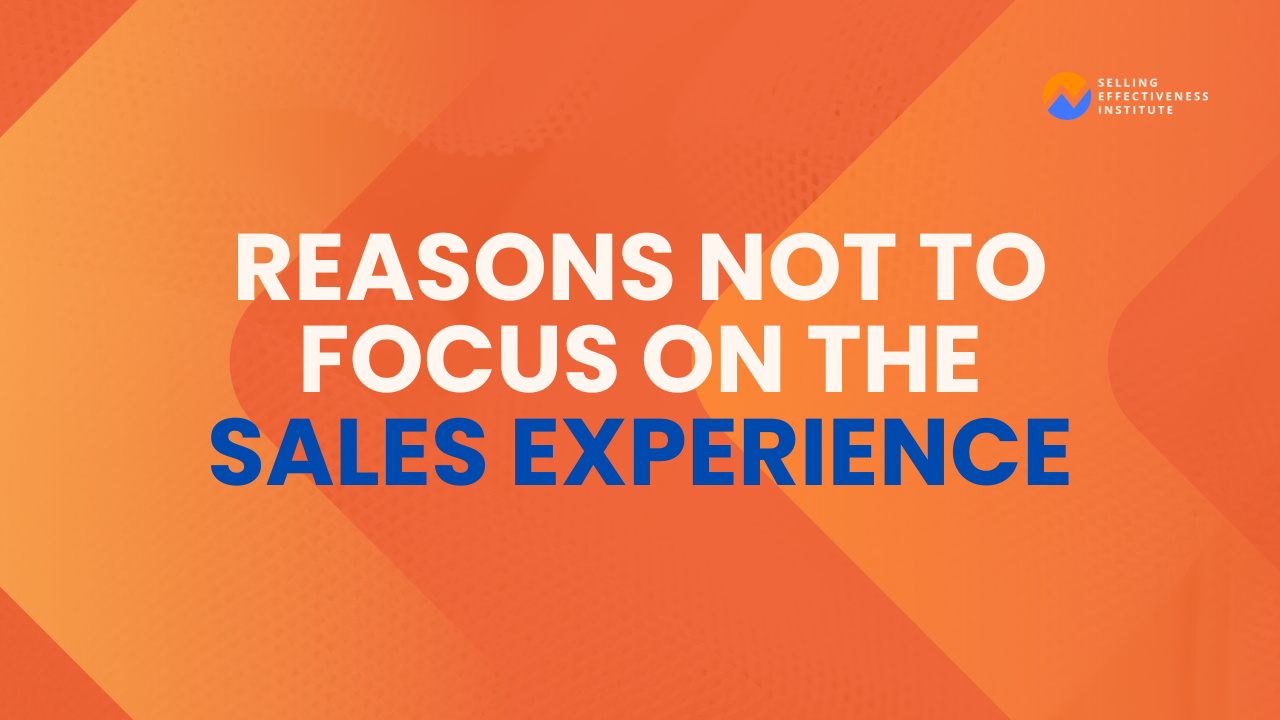
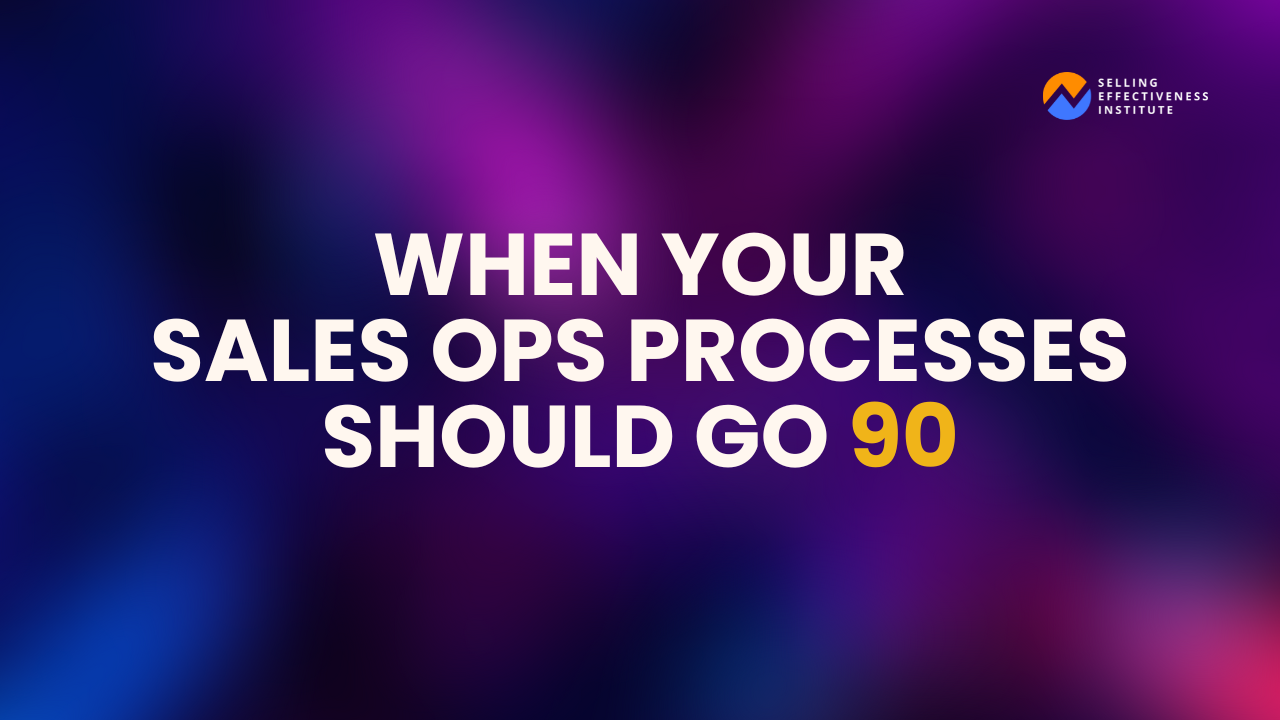
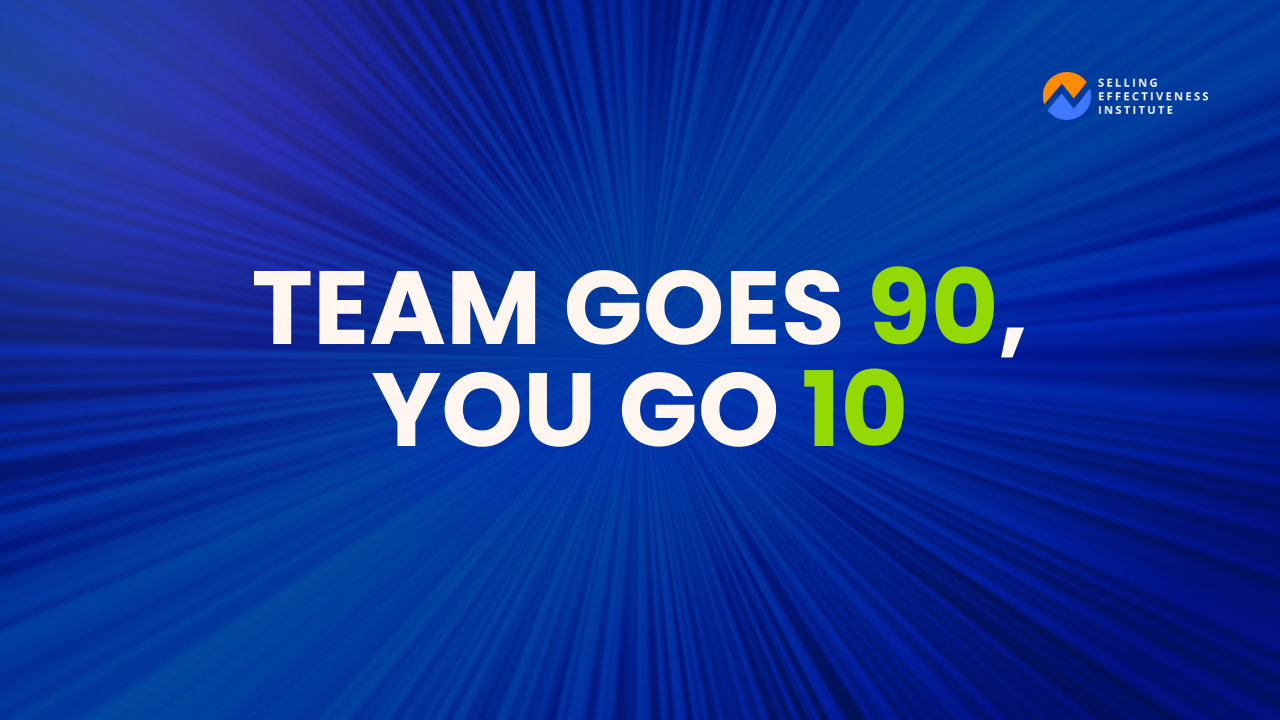
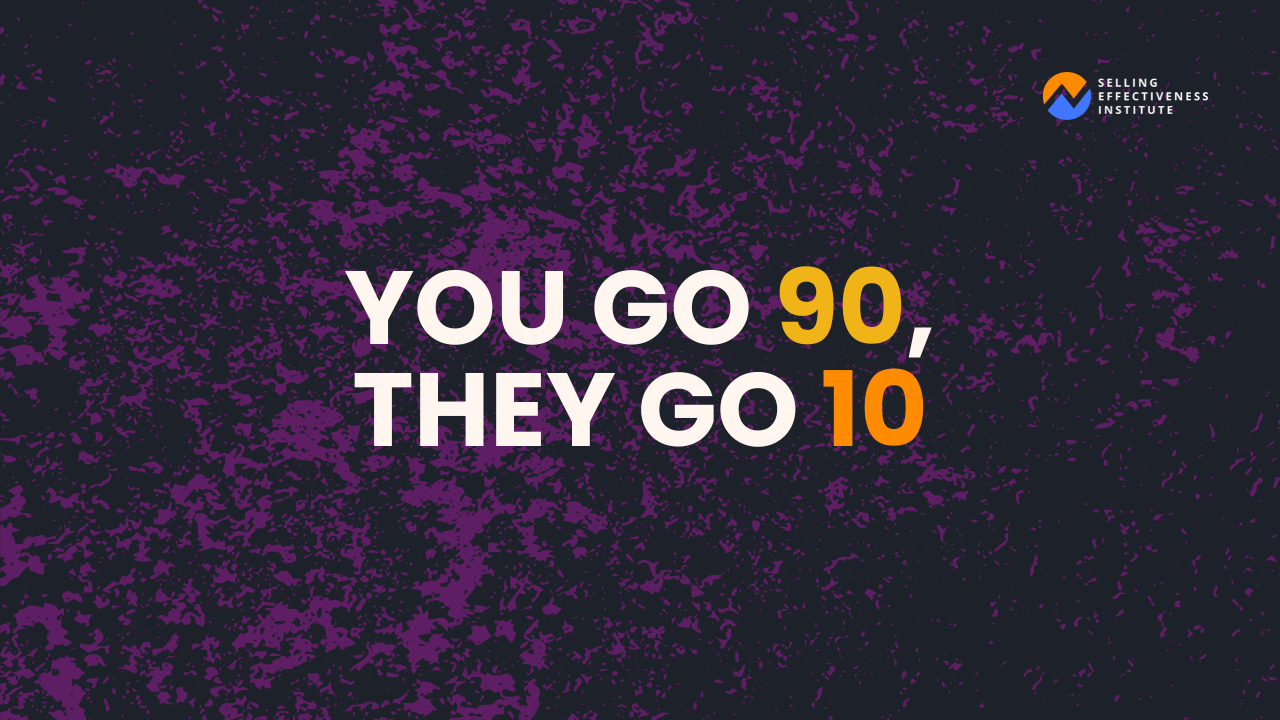
Phone: (239) 206-1919 | Email: info@sellingeffectiveness.com
Copyright © 2023 Selling Effectiveness Institute. All rights reserved.

